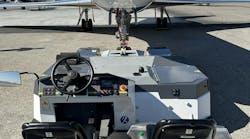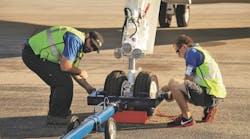British Airways PLC posted a 24 percent drop in its fiscal second-quarter net profit Friday, blaming higher fuel costs and the absence of a large one-time gain that boosted the result a year ago.
However, the airline said it expects improved yields, or average fares, over the full year and raised its revenue guidance to between 6 percent and 7 percent growth - up half a percentage point from its previous forecast.
BA said net profit for the three months ending Sept. 30 fell to 171 million pounds ($302.1 million) from 225 million pounds. Last year's net profit was boosted by an 86 million pound gain from the sale of shares in Australia's Qantas Airways Ltd.
The airline also revealed that an August strike by staff at catering firm Gate Gourmet and BA ground workers, which led to hundreds of canceled flights, cost the company between 35 million pounds and 45 million pounds ($61.8 million and $79.5 million).
The figure was in line with analyst estimates and BA said the cost did not have a material impact on the quarterly results because the airline also suffered disruption in the comparative period last year.
Revenue rose 8.2 percent to 2.21 billion pounds ($3.9 billion).
"This is a reasonable set of results driven by improvements in revenue, seat factor and yield. It is clear, however, that we need to re-energize our drive on controllable costs," said Chief Executive Willie Walsh, who took over the reins at BA last month following the retirement of Rod Eddington.
"Costs are up in most areas. Fuel was the biggest single contributor, up a staggering 51.3 percent," he added.
Walsh reiterated that BA would not achieve its goal of a 10 percent operating margin, a target set by Eddington, this year because of record-high fuel costs. The operating margin is operating income divided by revenue, and indicates how much a company makes from each dollar of sales, before interest and taxes. BA achieved an operating margin of 6.9 percent last year.
BA earns the majority of its profits from its long-haul first- and business-class operations, including the trans-Atlantic route.
Walsh said that the airline's performance on the short-haul routes, where it faces tough competition from budget carriers like Ryanair Holdings PLC and easyJet PLC, was improving and is expected to be profitable over the full year.
He is also focused on the airline's move to a base at Heathrow Airport's new Terminal 5, which is due to be completed in 2008.
BA shares fell 2.9 percent to 304.75 pence ($5.38) on the London Stock Exchange.
News stories provided by third parties are not edited by "Site Publication" staff. For suggestions and comments, please click the Contact link at the bottom of this page.





